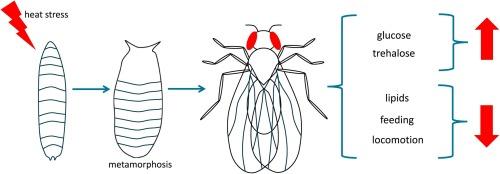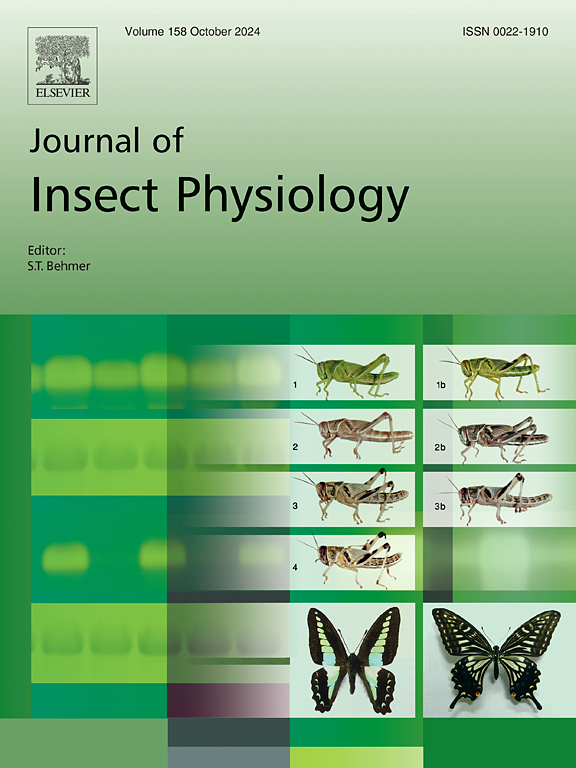Larval stress affects adult Drosophila behavior and metabolism
IF 2.3
2区 农林科学
Q1 ENTOMOLOGY
引用次数: 0
Abstract
In this study, we raised the following question: “Does metamorphosis, being a “reboot” of all systems of the organism, erase the changes that occurred at earlier stages of insect development?” To answer this question, we investigated several behavioral, metabolic and neuroendocrine parameters in Drosophila melanogaster imago that had undergone heat stress at the 3rd larval instar (32 °C, 48 h). We discovered that larval stress negatively affected feeding and locomotor behavior, as well as total lipid content in adult flies. At the same time, these flies demonstrated a considerable increase in carbohydrate content and expression level of insulin/insulin-like growth factor signaling (IIS) pathway genes, dfoxo, dilp6 and dInR. The data obtained allow us to conclude that metamorphosis does not erase the effect of stress exposure at early developmental stages and causes dramatic changes in carbohydrate and lipid metabolism as well as locomotor activity of adult insects, which is at least in part due to changes in IIS activity.

幼虫应激影响果蝇成虫的行为和新陈代谢
在这项研究中,我们提出了以下问题:"变态作为生物体所有系统的 "重启",是否会消除昆虫发育早期阶段发生的变化?为了回答这个问题,我们研究了黑腹果蝇在幼虫3龄期(32 °C,48小时)经历热胁迫后的几个行为、代谢和神经内分泌参数。我们发现,幼虫应激会对成蝇的摄食和运动行为以及总脂质含量产生负面影响。同时,这些苍蝇的碳水化合物含量和胰岛素/类胰岛素生长因子信号转导(IIS)通路基因 dfoxo、dilp6 和 dInR 的表达水平都有显著增加。这些数据让我们得出结论:变态并不能消除早期发育阶段受到的应激影响,并会导致成虫的碳水化合物和脂质代谢以及运动活动发生巨大变化,而这至少部分是由于 IIS 活性的变化造成的。
本文章由计算机程序翻译,如有差异,请以英文原文为准。
求助全文
约1分钟内获得全文
求助全文
来源期刊

Journal of insect physiology
生物-昆虫学
CiteScore
4.50
自引率
4.50%
发文量
77
审稿时长
57 days
期刊介绍:
All aspects of insect physiology are published in this journal which will also accept papers on the physiology of other arthropods, if the referees consider the work to be of general interest. The coverage includes endocrinology (in relation to moulting, reproduction and metabolism), pheromones, neurobiology (cellular, integrative and developmental), physiological pharmacology, nutrition (food selection, digestion and absorption), homeostasis, excretion, reproduction and behaviour. Papers covering functional genomics and molecular approaches to physiological problems will also be included. Communications on structure and applied entomology can be published if the subject matter has an explicit bearing on the physiology of arthropods. Review articles and novel method papers are also welcomed.
 求助内容:
求助内容: 应助结果提醒方式:
应助结果提醒方式:


